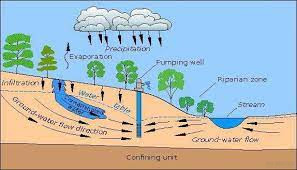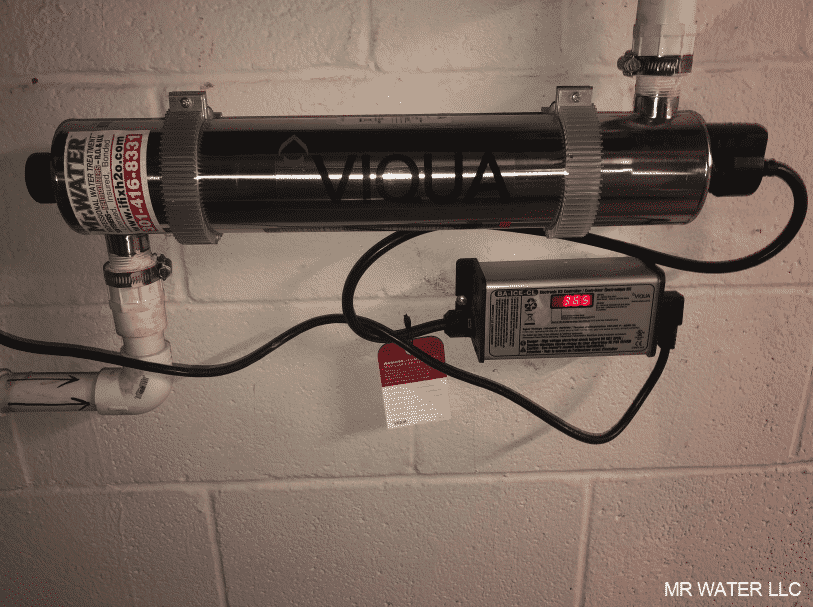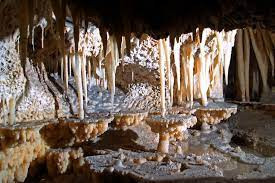Water Treatment Service for Hagerstown and Washington County Maryland
Well Water Softeners, Sulfur Removal and Iron Filtration Systems
Hard Water, Iron, Sulfur are commonly found in Hagerstown and Washington County
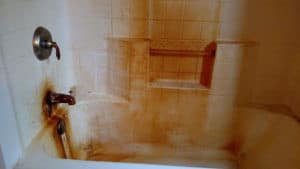
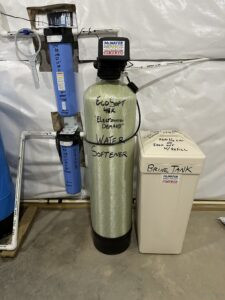
Hagerstown, Maryland, and the surrounding Washington County area face significant challenges with hard water as well as issues with iron and sulfur in their well water supply. Hard water, characterized by high levels of calcium carbonate, can lead to scale buildup in pipes and appliances, causing damage over time. Additionally, iron and sulfur can cause staining and unpleasant odors in water.
By installing a Water Softener with Closed Pressure Aeration can effectively address these water quality issues. Water softeners work by removing minerals that cause hardness, while closed pressure aeration systems can help oxidize and remove iron and sulfur compounds from the water.
By addressing these problem water conditions, residents can enjoy improved water quality, extend the lifespan of their plumbing and appliances, and avoid issues like staining and foul odors associated with iron and sulfur contamination.
The Troublesome Trio - Iron, Manganese and Hydrogen Sulfide

The combination of Iron, Sulfur, and Manganese in well water is indeed often referred to as the “Bermuda Triangle” of water problems due to the challenges they pose for residential water treatment equipment. Each of these contaminants presents its own unique set of issues, and addressing all three simultaneously can be particularly difficult.
Iron can cause staining and discoloration of fixtures and laundry, while Hydrogen Sulfide creates unpleasant “rotten egg” odors and taste in well water. Manganese, like Iron, will also lead to staining and will negatively affect the taste and odor of well water.
Because of the complexity of treating well water containing these contaminants, most national water treatment companies do not have equipment specifically designed to effectively address all three simultaneously. This can leave homeowners and businesses in areas like Hagerstown, Maryland, and Washington County facing difficulties in finding reliable long-term solutions to their water quality problems.
We are specialists in custom water treatment solutions and we are much better equipped to address the unique challenges posed by the “Bermuda Triangle” of water problems in this region.
Mr. Water Professional Water Treatment of Maryland provides tailored solutions to effectively remove Iron, Sulfur, and Manganese from residential water supplies, ensuring clean, great tasting and high-quality water for homeowners and businesses alike.
Hagerstown, Maryland, and Washington County area, combinations of hard water, iron, and occasionally manganese are common water quality issues for residents. The presence of Hydrogen Sulfide, which causes the characteristic “rotten egg” smell, further compounds the water quality challenges.
While a properly constructed and maintained Water Softener can effectively address hard water issues, additional treatment will be necessary to tackle sulfur contamination. Air injection Systems are a valuable addition to a water treatment setup to address sulphur problems. These systems work by injecting air into the water, oxidizing the Hydrogen Sulfide and causing it to precipitate out of the water, eliminating the foul odor.
In cases where Manganese is present, it can cause black stains on fixtures and appliances and create an unpleasant odor in hot water, similar to the issues associated with Iron. Addressing manganese requires a high capacity Water Softener.
By combining a Water Softener with additional treatment methods such as Air Injection for Sulfur removal, residents can effectively tackle the range of water quality issues commonly found in the area, ensuring clean, odor-free water for their homes and businesses. Regular maintenance and monitoring are essential to ensure the continued effectiveness of these treatment systems.
It’s interesting to note the geological influence on water quality in Washington County, Maryland. The prevalence of limestone formations in the area plays a significant role in neutralizing acidic groundwater and subsequently raising the pH of well water. This natural process helps mitigate the occurrence of acidic well water in comparison to other regions in Maryland, particularly those to the east.
Limestone, composed primarily of calcium carbonate, has the ability to neutralize acids through a chemical reaction, effectively increasing the pH of the water. As a result, the water tends to be less acidic and more alkaline, contributing to the formation of hard water due to the dissolved minerals, primarily calcium and magnesium, in the groundwater.
This geological characteristic not only influences the pH levels of well water but also contributes to the prevalence of hard water in the area. Understanding these natural processes can be beneficial for residents and businesses when considering water treatment options tailored to the specific water quality challenges they face.
It’s true that many consumer-grade Water Softeners, typically found at retail stores like Lowes® and Home Depot®, are designed mainly for municipal water supplies and may not be suitable for treating severe problem water commonly found in private well water systems. These units have limited capabilities that cannot effectively address problem water issues such as high levels of Iron, Sulfur, Manganese or Hardness.
Similarly, Water Conditioners from national companies like Culligan®, EcoWater® and Hague® also have limitations in addressing severe problem water due to their standardized product lines.
Custom-built Water Softener systems offer a tailored solution to address specific water quality challenges, ensuring effective treatment and long-term reliability. By designing systems that are specifically suited to the unique characteristics of a well water source, custom-built solutions provide comprehensive treatment for issues such as Iron, Sulfur, and Hardness.
Our company’s patented Water Softener Technology provides a simple and reliable treatment method for these common water quality problems. By offering innovative solutions tailored to the needs of well water users, Mr. Water LLC can help homeowners and businesses in areas like Washington County, Maryland, effectively manage and improve their well water quality for many years to come.
Visit this page to learn more about this revolutionary Aerated Water Softener System:
Contact Mr. Water LLC
Please complete the form below
Your LOCAL Water Softening and Conditioning Expert!
Cave (Karst) Geology can have a big
influence on the water in this area
The Karst geology in the Hagerstown and Washington County area of Maryland indeed adds another layer of complexity to the region’s water quality. Karst landscapes, characterized by soluble rock formations such as limestone, are known for their distinctive features such as caves, sinkholes, and underground drainage systems.
The porous nature of limestone allows water to flow more freely through the ground, which can lead to rapid infiltration and recharge of aquifers. This, in turn, can result in a higher susceptibility to contamination from surface pollutants, as well as the potential for rapid changes in ground water quality.
Additionally, the intricate network of caves and caverns in Karst regions can serve as conduits for water movement, potentially allowing contaminants to travel more easily through the groundwater system.
Understanding the influence of Karst geology on drinking water quality is crucial for residents and water treatment specialists in the area. It highlights the importance of comprehensive water testing and tailored treatment solutions to address the specific challenges posed by the unique hydrogeological conditions of the region.
By considering the geological characteristics of the area, water treatment professionals can better identify potential sources of contamination and develop effective strategies to safeguard drinking water quality for local residents and businesses.
Ground Water Under the Direct Influence of Surface Water (GWUDI)
Drawing water from a Ground Water Under the Direct Influence of surface water (GWUDI) system presents unique challenges for private drinking water wells. Because these wells are susceptible to fluctuations in water quality, they can be prone to issues such as turbidity, siltiness, and even the presence of pathogens like Bacteria, Viruses, and Parasites.
To address these concerns and ensure safe drinking water, a comprehensive water conditioning system is typically installed. This system often includes several components:
Sediment or Turbidity Filter: This filter helps remove larger particles such as sediment and silt from the water, improving clarity and reducing turbidity.
Water Softener: A water softener is used to remove minerals such as calcium and magnesium that cause hardness in the water. This helps prevent scale buildup in pipes and appliances and ensures better lathering of soap.
Carbon Filter: Carbon filtration helps remove organic contaminants, chlorine, and other chemicals that may affect taste, odor, and overall water quality.
Ultraviolet (UV) Disinfection System with Intensity Monitor: UV disinfection systems use ultraviolet light to kill or inactivate bacteria, viruses, and other pathogens present in the water. An intensity monitor ensures that the UV light is operating at the correct intensity to effectively disinfect the water.
By incorporating these components into a water conditioning system, homeowners with private drinking water wells drawing from GWUDI sources can effectively address a range of water quality concerns and ensure that their water is safe and healthy for consumption. Regular maintenance and monitoring of the system are essential to ensure continued effectiveness and optimal performance.
